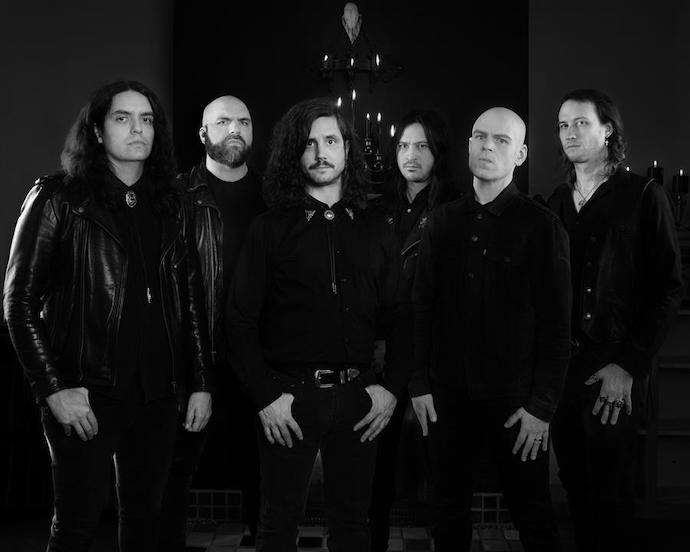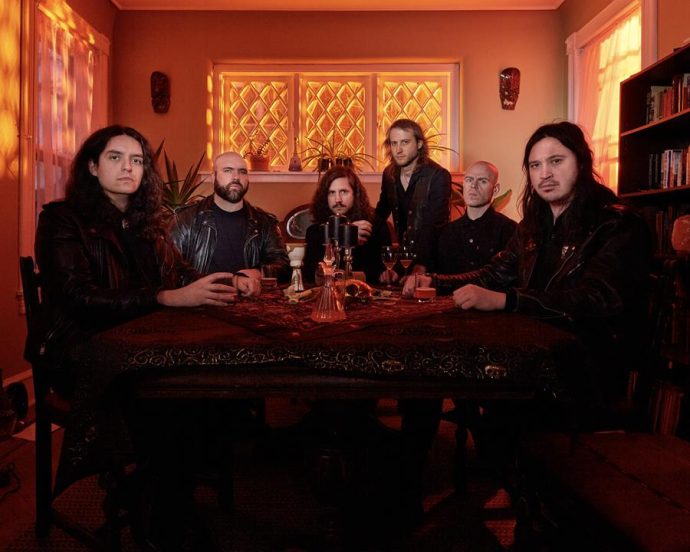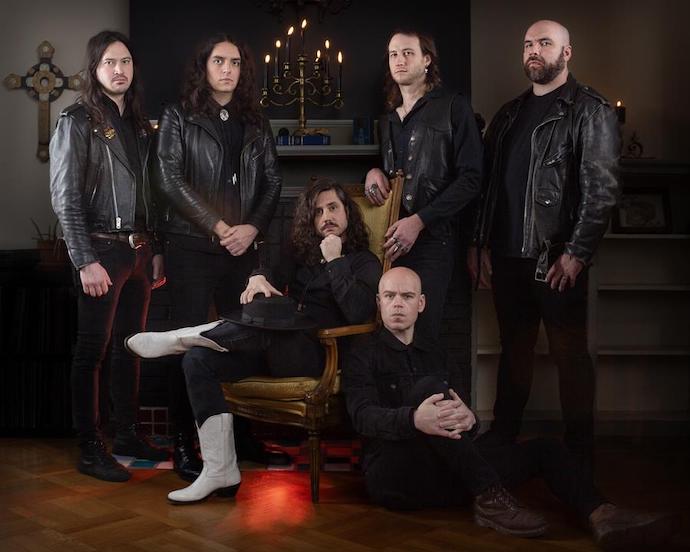
Photo credit: Scott Kincade
(Today we’re very happy to present Comrade Aleks‘ excellent interview with frontman Brooks Wilson from Crypt Sermon, whose new album is set for release on June 14th via Dark Descent Records.)
The Philadelphia doom crew Crypt Sermon took the matter seriously from the very beginning, and the first album Out of the Garden (2015) became, if not a modern classic, at least a significant phenomenon for the doom scene. The second release The Ruins of Fading Light (2019) cemented Crypt Sermon’s reputation as one of the most relevant “new” epic doom bands, but how to grow further with such a triumphant start?
The band’s new album The Stygian Rose is to be released on June 14th, and its lyrics are partly inspired by the ideas of American medium and occult writer Pascal Beverly Randolph. They mix very traditional doom with magical retro metal, combining crushing riffs and shimmering guitar melodies, and Crypt Sermon go into the large-scale and epic doom-ascension with no final destination.
Crypt Sermon are endearing due to their fidelity to heavy metal doom roots and their artistic take on the rigid form of the genre. We have done the interview with the band’s frontman Brooks Wilson, and it’ll help us learn more about the story behind The Stygian Rose and further.

photo from Northwest Terror Fest by John Malley
Hail Crypt Sermon! How are you doing? Who’s online today?
This is Brooks Wilson, all is well.
Good to hear you, Brooks. I’ve just found that the band had its tenth anniversary in 2023, accept my congratulations! Did you celebrate this date somehow?
I think we celebrated our anniversary as a band by welcoming a couple new musicians into the fold.
How do you value your achievements as the band? Can you say that you achieved much during this period?
We got some good press, and we sold a good bit of records through the mail, but we were really hamstrung when it came to our live plans around our second album. It’s hard for us to gauge just how much we’ve achieved if we can’t play those shows and really connect to the fans.
Do you mean that Covid prevented you from performing The Ruins of Fading Light live actively? Did it really impact the band?
Yes, we had a short European tour planned for 2020, among a few other scattershot European dates. I think our first show back was like September 2021. We had some dates rescheduled for Europe 2022, but by that point, we had some personnel issues which disallowed us from both performing and (temporarily) writing. It took us a little while to figure out what way we wanted to move forward, and at that point we were beginning to dig into songwriting, so our new members contributed more to that rather than practicing for live events.

I’ve just listened to The Stygian Rose, and first of all, it sounds absolutely solid. It’s a mature record, and that’s natural if we take in account the band’s anniversary, and still I’m impressed. It’s a killer album. How long did you work on these songs? How scrupulously was the process?
A few songs have kind of been around shortly after The Ruins of Fading Light came out, and songwriting was sort of ongoing to some degree. Still, when we really locked down our recording lineup, it took about a year and a half from concept to final product. We all contributed to the writing this time, and collaborated more than before. As such, we were able to lock down some of the defining features of our sound early on in the writing process, then focus on how to build other ideas off that.
What kind of features do you mean? An overall triumphant doom metal vibe? And what kind of new ideas did you want to incorporate in this album?
I think our core sound is defined as grandiose doom metal inspired by Candlemass and Solitude Aeturnus, as well as some references to Mercyful Fate. We built on that core sound by incorporating the vast influences from our various backgrounds in extreme metal, goth, and more experimental approaches we’ve taken with our other bands. We wanted this album to be our previous efforts taken to its logical conclusion, but we were not going to repeat ourselves. This album is more of everything. It’s darker, heavier, more muscular, meaner, but it’s full of contradictions. This album is also more intimate, fragile, and emotional. We incorporated a lot of progressive elements, and didn’t hold back on the shred.
Once again you recorded with Arthur Rizk, and of course he’s the right man in your situation. He plays in Eternal Champion, and he worked with Cirith Ungil and Summerlands among others. It seems like you share the same cultural background. How important is it for you to work with like-minded people? And do you feel yourself an outsider in your daily life?
Well, Arthur is kind of part of the family. We come from the same city and scene, so it’s just natural to work with him; we’ve basically followed his trajectory. His progress as a producer is reflected in every album we’ve recorded, which is to say we are very happy with the results.
As far as feeling like an outsider in my daily life, no.
Arthur is mentioned as the album’s producer — which role did he play during the recording sessions?
Yeah, we definitely trust Arthur to really shape our sound and capture the ideas that we are after. We speak the same musical language, so while we don’t have the technical know-how, Arthur can translate our ideas into sonic form.
Probably, it doesn’t matter, as we talk about doom metal, but this time you recorded the longest song in your discography: The title track’s duration is over 11 minutes. Was it a challenge for you? What was your general idea behind this composition?
We knew what kind of songs and approaches to songwriting we wanted to cover on the album, so once we sat down to write that song and record the demo, we basically knew what we were getting into. I think Steve and I wrote that one together, and we’ve been in bands that have approached songwriting similarly in the past, with that build-into-a-crescendo approach, so the real key was to make sure that a long song is worth listening to the whole way through. We weren’t trying to write a long song for the sake of it, but rather to guide the musical and narrative arc of the album.
All of Crypt Sermon’s lyrics have a recognizable doom metal vibe, and yet let me ask this blunt question: Is The Stygian Rose a concept album?
The Stygian Rose follows a character inspired by Paschal Beverly Randolf, an early American spiritualist and sex magician. In The Stygian Rose, the unnamed character seeks to reconnect with his now maybe dead, definitely lost (though intentionally left vague) idealized female, embodying the Sophia/Shakti/Persephone, the divine wisdom/feminine concept. This lost love is believed to be waiting for him, calling for him from ‘the hollow,’ a pandemonic world beyond life, death, and the doors of perception. In his search he engages in a variety of magical practices to see beyond the veil of our material experience. The protagonist’s harrowing jaunt starts with “Glimmers in the Underworld,” and ends naturally with the title track. The story, as unfurled in the lyrics, is directly connected to the album’s artwork and booklet.
What drew your attention to Paschal Beverly Randolf’s ideas? In general, the “sex magic” thing reminds me of the story of Osho and other similar gurus.
I have a deep interest in the western esoteric tradition, as it is a natural outgrowth of Christian cultural hegemony. Things like hermeticism and gnosticism developed concurrently with Christianity and Islam in the middle ages, and I felt like I had kind of exhausted that as a source of inspiration. I had really started to focus on the American Spiritualist movement as a source of inspiration for The Stygian Rose, and with that was – of course – a little look into the life of Helena Blavatsky.
In learning more about that, trying to figure out how she got the connection to India in her work (as opposed to Egypt, from where most western esotericism draws its inspiration), that reference to India led me to investigate those who influenced Blavatsky (and especially those who she might have crossed paths with while in Philadelphia). Through hearsay, rumour, and reading lots and lots of Blavatsky’s and other early Theosophist writings, I came across the name Paschal Beverly Randolph.
I had come across Randolph earlier as one of America’s founding Rosicrucians (this is a claim put upon Randolph, and it’s certain he started one of the first Rosicrucian organizations still operating today in Quakertown, PA). He was a medical doctor, spiritualist, and medium (I am quite skeptical of any of these more supernatural claims) and he was a free black man living through the abolition movement. He was an advocate for cannabis, and found gender and gender roles to be “parochial”.
On the topic of “sex magic” Randolph is credited as the first to write about the topic in the form of “erotic alchemy.” It profoundly influenced western esoteric practices, most notably Aleister Crowley’s Thelema. There are some similarities to tantra, but like everything in the west, there’s a tendency to try to “science things up a bit”. I’ve basically read everything by Randolph, but with that said, The Stygian Rose is not his story. It is inspired by his character, someone who is so fully driven by their journey that they profoundly influence magic practices, though they may not get much credit.

Photo credit: Scott Kincade
If we take a look at the modern doom metal scene, it seems that we’ll see stagnation to some degree. On one hand, there are a lot of new bands – great, promising, mediocre, and so on. On the other hand, European doom festivals from the ’00s don’t happen anymore. How does it look from your side?
I totally agree that there’s stagnation, and I think that’s why we don’t really feel connected to any “doom” scene. There are some doom fests here in the States, but with a heavy focus on the more stoner and blues-oriented doom. There’s a bit of an American folk overlap sometimes, so it’s cool that there’s variety. Crypt Sermon, however, stands apart from those bands in our approach to just about everything, so we inhabit a genre of Doom that just doesn’t have a scene here. We’re pretty closely associated with some of the “traditional metal” bands that have been our cohort, but I don’t think we feel especially beholden to performing that style of music or catering to that audience. We are going to continue to explore the boundaries.
Do you think that traditional metal lives through its renaissance nowadays? Or is this wave almost over?
I can’t really tell if it’s having its renaissance. I think it would have to be generally more popular to make such a claim, but I notice that traditional styles of heavy metal are becoming more popular with the same people who also listen to extreme metal.
The fact of the matter is, I’ve never seen a traditional metal band on the more popular magazine covers, even though I’d argue some of them deserve it. So I think it’s not necessarily becoming “more popular” but just capturing a wider audience that is already sympathetic to the style. Becoming more popular within an already insular scene.
Personally, I am hoping that the wave of copy-cat bands comes to an end, and bands who are rooted in traditional approaches to heavy metal look at some ways that they can expand their sound. It does seem like we are over the rush of bands all playing the same style coming out at the same time.
Three of the band’s members take part in the black metal act Daeva. Did it slow down the work on The Stygian Rose?
Honestly, No. Musical output is a constant for our band. I think we’re kind of feeling out how both bands can continue to function, and we don’t seem to have any contradictions. Most notably were the different approaches to collaboration with writing The Stygian Rose.

Photo credit: Scott Kincade
What are your further plans for the rest of 2024?
We’ve got some shows in the works and we’re actually continuing to write and start to feel out themes for the next album.
Thanks for the interview, Brooks! I wish you all the best with Crypt Sermon shows in this year. Did we skip something important?
Thank you. If I’ve forgotten anything it is because my brain is Swiss cheese from the returning flight from our first show back!
https://www.facebook.com/CryptSermon
https://cryptsermon.bandcamp.com/

Cool interview. These new songs sound great.